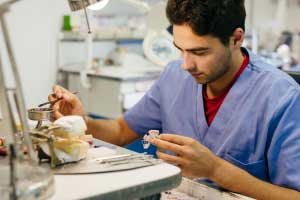Disclaimer: The information on our website is provided for general information purposes only. We make no representations or warranties of any kind, express or implied, about the completeness, accuracy, reliability, suitability or availability with respect to the website or the information contained on our website for any purpose. Any reliance on such information is therefore strictly at your own risk and we are not liable for any damages or losses arising out of or resulting from your reliance on any information contained on our website.
If you like science, art, and helping people, a career as a dental laboratory technician may be worth researching. Those in this career field use molds of patient’s teeth or soft tissue and create functional, artificial oral prosthetics. These are designed to a dentist’s specifications using a variety of techniques. These techs work in private dental offices or in commercial laboratories. Watch a video to learn what a dental laboratory technician does.
How to Become a Dental Laboratory Technician

Though dental laboratory technicians do not have to have formal training, it may be easier to gain employment by attending a two-year training program offered at a trade or technical school or community college. According to ADA.org (link opens in a new tab), there are approximately 24 accredited dental laboratory technology programs.
Once graduating one of these programs and passing an exam, graduates become Certified Dental Technicians, or CDTs. The ADA reports that CDTs can specialize in one or more of six areas: implants, complete dentures, removable partial dentures, crown and bridge, ceramics or orthodontics.
Dental Laboratory Technician Job Description
Dental laboratory technicians may work in a large, commercial dental laboratories specializing in the creation of various dental prosthetics. They may also work in a private dental office working closely with the dentist to meet their client’s needs. Depending their work environment, they may or may not have close communication with a dentist. Whether they work closely in person with a dentist or not, the tech would need to read and follow the specifications ordered by a dentist, review any models or impressions taken of the patient, and create a functional prosthetic for the patient.
Dental lab technicians will also use a variety of mediums to create molds and design prosthetics that can mimic a patient’s natural bite and move with their jaw. As every prosthetic is tailored to a patient, every product they create varies and can provide a career that offers a variety of different tasks to accomplish in any given day.
This his career offers a lot of flexibility as they can perform their craft without close supervision. Those in this career also get the chance to create a product from start to finish and may also have the opportunity to be creative when creating the prostheses. This is also rewarding as those in this field understand that their creations help people lead more functional lives while also providing a positive self image.
Dental Laboratory Technician Career Video
Fabricating eyeglasses and dental appliances requires skill with precise instruments… exacting accuracy… and an understanding of different materials. Dental and ophthalmic laboratory technicians rely on all these qualities to create and repair products to improve patients’ dental and vision health. Dental laboratory technicians use molds of a patient’s teeth to construct crowns, bridges, and dentures. They use hand tools and 3-D printers to form materials, such as wax, plastic, and porcelain, into prosthetic appliances.
Dental lab technicians work closely with dentists, but rarely interact with patients. Ophthalmic laboratory technicians make prescription eyeglasses and contact lenses. They may fill orders using automated equipment, or working by hand. Some make lenses for optical instruments, such as telescopes and binoculars. Technicians may need to wear goggles, gloves, or masks, and spend a great deal of time standing or bending. They work in medical equipment and supplies manufacturing, stores, and dentist and optometrist offices. Most work full-time. Dental and ophthalmic laboratory technicians typically need at least a high school diploma or equivalent and receive on-the-job training. High school courses in science, human anatomy, math, computer programming, and art may be helpful.
Article Citations
Bureau of Labor Statistics, U.S. Department of Labor, Occupational Outlook Handbook, Dental and Ophthalmic Laboratory Technicians and Medical Appliance Technicians.
National Center for O*NET Development. 51-9081.00. O*NET OnLine.
